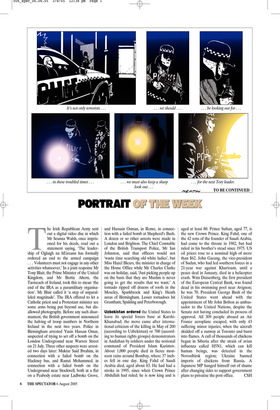PORTRAIT OF THE WEEK T he Irish Republican Army sent out
a digital video disc in which Mr Seanna Walsh, once imprisoned for his deeds, read out a statement saying, ‘The leadership of Oglaigh na hEireann has formally ordered an end to the armed campaign ... Volunteers must not engage in any other activities whatsoever.’ In a joint response Mr Tony Blair, the Prime Minister of the United Kingdom, and Mr Bertie Ahern, the Taoiseach of Ireland, took this to mean ‘the end of the IRA as a paramilitary organisation’. Mr Blair called it ‘a step of unparalleled magnitude’. The IRA offered to let a Catholic priest and a Protestant minister see some arms being put beyond use, but disallowed photography. Before any such disarmament, the British government announced the halving of troop numbers in Northern Ireland in the next two years. Police in Birmingham arrested Yasin Hassan Omar, suspected of trying to set off a bomb on the London Underground near Warren Street on 21 July. Three other suspects were arrested two days later: Muktar Said Ibrahim, in connection with a failed bomb on the Hackney bus, and Ramzi Mohammed, in connection with a failed bomb on the Underground near Stockwell, both at a flat on a Peabody estate near Ladbroke Grove, and Hussain Osman, in Rome, in connection with a failed bomb at Shepherd’s Bush. A dozen or so other arrests were made in London and Brighton. The Chief Constable of the British Transport Police, Mr Ian Johnston, said that officers would not ‘waste time searching old white ladies’, but Miss Hazel Blears, the minister in charge of the Home Office while Mr Charles Clarke was on holiday, said, ‘Just picking people up on the basis that they are Muslim is never going to get the results that we want.’ A tornado ripped off dozens of roofs in the Moseley, Sparkbrook and King’s Heath areas of Birmingham. Lesser tornadoes hit Grantham, Spalding and Peterborough.
Uzbekistan ordered the United States to leave its special forces base at KarshiKhanabad; the move came after international criticism of the killing in May of 200 (according to Uzbekistan) or 700 (according to human rights groups) demonstrators in Andizhan by soldiers under the notional command of President Islam Karimov. About 1,000 people died in fierce monsoon rains around Bombay, where 37 inches fell in one day. King Fahd of Saudi Arabia died, aged about 83. He had had a stroke in 1995, since when Crown Prince Abdullah had ruled; he is now king and is aged at least 80. Prince Sultan, aged 77, is the new Crown Prince. King Fahd, one of the 42 sons of the founder of Saudi Arabia, had come to the throne in 1982, but had ruled in his brother’s stead since 1975. US oil prices rose to a nominal high of more than $62. John Garang, the vice-president of Sudan, who had led southern forces in a 21-year war against Khartoum, until a peace deal in January, died in a helicopter crash. Wim Duisenberg, the first president of the European Central Bank, was found dead in his swimming pool near Avignon; he was 70. President George Bush of the United States went ahead with the appointment of Mr John Bolton as ambassador to the United Nations, despite the Senate not having concluded its process of approval. All 309 people aboard an Air France aeroplane escaped, with only 43 suffering minor injuries, when the aircraft skidded off a runway at Toronto and burst into flames. A cull of thousands of chickens began in Siberia after the strain of avian influenza called H5N1, which can kill human beings, was detected in the Novosibirsk region; Ukraine banned imports of chickens from Russia. A Japanese MP hanged himself out of shame after changing sides to support government plans to privatise the post office. CSH











































 Previous page
Previous page